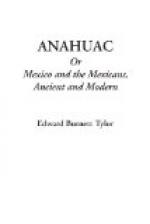On Thursday at noon mass is over, the bells cease to ring, the organs in the churches are silent, and all carriages disappear from the streets, except the dusty Diligence which, like French law, “est athee,” and cares nothing for fasts or festivals. Now we come to understand the wonderful wooden machine like a water-wheel, which was put up yesterday on one tower of the Cathedral. We had asked people in the great square, just below, what it was, but could get no answer except that it was la Matraca, the rattle, for to-morrow. And now we found that, the church bells being incapacitated, this rattle does duty instead, striking the hours, and occasionally going off into furious fits of clattering, without apparent reason, for ten minutes at a time, till the two men who worked it, who were either convicts or soldiers in fatigue-dress, were tired out. It was not this one rattle only that was disturbing the public peace that day and the next. Everybody was walking about with a rattle, and working it like mad, and all over the city there was a noise like the sound of the back-scratchers at Greenwich Fair, or of an American forest when the woodpeckers are busy. These little rattles stand for Judas’s bones, and all good Catholics express in this odd way their desire to break them. They do the same thing in Italy, but it is not so prominent a part of the celebration as in Mexico, where old and young, rich and poor, all do their part in it. As soon as we found out what it all meant, we bought matracas for ourselves, and joined the rest of the world in their noisy occupation. The breaking of his bones is but a preliminary measure. In the square a fair is being held, in the booths of which the great articles of trade now are Judas’s bones, of many patterns, at all prices, and Judas himself in pasteboard, who is to be carried about and insulted till Saturday morning, and then, hanging up by a string, is to burst asunder by means of a packet of powder and a slow match in his inside, and finally to perish in a bonfire.
The first sight of these pasteboard Judases convinced us of one thing, that we had unexpectedly come upon the old custom, of which our processions and burning of Guy Fawkes in England are merely an adaptation. After giving up the old custom as a Popish rite, what a blight idea to revive it in this new shape, and to give the boys something to carry about, bang, blow up, and make a final bonfire of, and all in the Protestant




